Burundians suffer executions, torture and rape among human rights abuses says UN
UN report names suspects and says government used security apparatus to carry out possible crimes against humanity.

United Nations investigators have expressed grave concerns about the human rights situation in Burundi as it published a report and listed suspects behind alleged violations amounting to crimes against humanity. The UN Independent Investigation in Burundi (UNIIB), which was established by the UN Human Rights Council in 17 December 2015, was mandated to undertake an investigation into violations and abuses of human rights in Burundi which has been rocked by a bloody crisis for 18 months.
In its report published on 20 September, the UN probe team described "abundant evidence of gross human rights violations as well as human rights abuses by the government and people whose actions can be attributed to the government" which may amount to crimes against humanity. It warned about the looming risk of genocide.
UNIIB principal findings
The UNIIB alleged Burundi's government was behind systematic human rights abuses, including executions and torture. It said these included:
- The government using the security apparatus – the Burundi National Police (PNB), the National Intelligence Service (SNR), and the National Defence Force (FDN) and the youth wing of the ruling party, the Imbonerakure, against political opponents to carry out gross violations and a general clamp-down on civil society
- A "clearly conservative estimate" of 564 cases of arbitrary executions since 26 April 2015. The large majority of victims were identified as people who were opposed, or were perceived to be opposed, to the third mandate of President Pierre Nkurunziza or were members of opposition parties
- Executions committed on a large sale by the security forces, often supported by the Imbonerakure, the youth wing of the CNDD-FDD ruling party
- UNIIB received testimony corroborating the existence of mass graves in Bujumbura (in Kanyosha and Mpanda) and Bubanza
- The existence of several lists of people, including civilians and military, to be eliminated by the security forces
- The existence of a group of 12 well-known SNR, police, and military agents who have allegedly been responsible for many cases of enforced disappearances, and who report directly to the inner circle of the executive
- The use of torture or other cruel, inhuman or degrading treatment or punishment against opponents. Ill-treatment included attaching weights to testicles, crushing of fingers and toes with pliers, detention in a closed container, forcing families to stay next to the dead body of a relative, forcing the victim to sit on acid, broken glass or nails, gang rape of a mother in the presence of her children, injections of a yellow liquid in the testicles and other parts of the body leading to paralysis, knife and machete stabs, lashes using preheated electric cable or iron bars, progressive burning with a blowtorch or gas cylinder, progressive electrocution, pulling a cord attached to the testicles, tightly tying a person's arms in the back for several days, insults and humiliating speech, including an ethnic dimension, poking of fingers in the eyes of the victim, tying the victim up by the feet upside down (known as "Amagurizege" in Kirundi)
- The exacerbation of sexual and gender-based violence. Findings included cases where many women who fled the country were subject to sexual violence during their flight by the Imbonerakure, unidentified armed men, and border guards, including as a punishment for leaving the country "while there was no war". Many Burundian women and girls related to males who opposed the third term, or were perceived as political dissidents, became the targets of physical and sexual violence by elements of the security forces. Other victims were sexually mutilated
- Allegations of sexual violence against men, particularly in detention
- Arbitrary or unlawful arrests and detention, including mass arrests, "a cornerstone of the repression in Burundi"
- Although the Prosecutor General of the Republic has formally denied the existence of unacknowledged places of detention, UNIIB concluded that there are reasonable grounds to believe that the Security Forces and the Imbonerakure have established several such sites
- Tit-for-tat targeted assassinations within the army – particularly threatening to the integration of the armed forces – in a crackdown by the authorities particularly targetting young Tutsi officers
- Various cases of ethnically divisive language have been documented, including inflammatory statements made by public officials that could constitute incitement to violence
- Burundian civil society actors, notably human rights defenders and journalists, have been primary targets of systematic repression by the authorities
- The government is failing to provide accountability mechanisms for human rights violations and UNIIB described a lack of meaningful cooperation with the international human rights system
- Armed elements in opposition to the government have also been involved in several murders, notably assassinations including Imbonerakure, and deadly grenade attacks

'Serious potential of the situation spiralling out of control'
Referring to the hundreds of thousands of Burundians who have fled to neighbouring countries and are internally displaced, the UN said: "Clearly many people on the ground believe they see signs of the horrors of the past repeating itself and flee."
The experts said they "are gravely concerned about the general trend of ethnically divisive rhetoric by the government, which may carry a serious potential of the situation spiralling out of control, including beyond Burundi's borders".
"No one can quantify exactly all the violations that have taken place and that continue to take place in a situation as closed and repressive as Burundi during the period covered by UNIIB's mandate," the report warned.
The three independent investigators confirmed they have compiled a list of alleged perpetrators of serious abuses and urged for "independent international judicial processes to bring the alleged perpetrators to justice".
Burundi government accuses UN report of bias
Burundi's government denied the claims.
"@UNHumanRights did not respect the usual rules by releasing the report without the response of @BurundiGov," the president's communications chief Willy Nyamitwe tweeted.
Responding to the allegations, the office of the President sent IBTimes UK a statement in which it said:
"Burundi welcomes the efforts by the UN for the protection of human rights in Burundi by sending experts to see the reality on ground. Burundi regrets, however, that the allegations contained in the report of these experts do not reflect the reality on the ground."
Highlighting what it described as "untruths", Burundi's government questioned the UN investigators' neutrality, claiming they may have been influenced by "critics of the democratically-elected institutions" and neighbouring Rwanda.
"It is clear that this is a report biased in many ways," the Presidency stated. "What is even more serious and intolerable, is that these experts downplay beyond measure the role of Rwanda in the crisis that has rocked Burundi, making a deliberate choice not to take into account different reports on the subject."
Downplaying the crisis, the government added: "When none of the thousands of schools in the country is closed and when people are free to go about their daily activities, when international sports games are organised and when open-air concerts take place until dawn, when UN agencies are organising Peace festivals, and when months pass without the sound of crackling weapons, these are not the hallmarks of a country in crisis."
Burundi's 18 months bloody crisis
Burundi's history, before and after independence in 1962 has been marked by repeated cycles of intense violence, including between ethnic communities - Hutu, Tutsi and Twa.
Burundi's current crisis that has killed up to 1,000 people in the country pits supporters of President Pierre Nkurunziza against those who say his re-election in July 2015 for a third term violated the constitution.
After a failed coup in May 2015, the government, both in rhetoric and in practice, associated demonstrators, mostly civilians, with the military coup leaders, and intensified its crackdown on anyone opposed to the president or the ruling CNDD-FDD party or who was suspected of having participated in demonstrations.
The security forces conducted frequent violent cordon and search operations in so-called "opposition neighbourhoods" of Bujumbura (Musaga, Ngagara, Kanyosha, and Nyakabiga) to track down demonstrators.
In reprisals, non-state actors including armed groups have engaged in human rights abuses such as assassinations of government officials and throwing grenades into public areas, killing civilians.
As of 25 August 2016, 286,036 Burundians have sought refuge in neighbouring countries, while the International Organization for Migration (IOM) reports 109,459 people displaced.
On 25 April 2016, the Office of the Prosecutor of the International Criminal Court started a "preliminary examination" on alleged crimes under the International Criminal Court's jurisdiction committed in Burundi since April 2015.
© Copyright IBTimes 2025. All rights reserved.






















